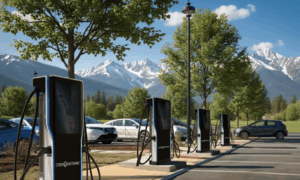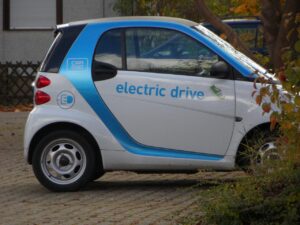
Home / EV Charging News / Are Electric Vehicles Less Expensive to Maintain Than Gasoline-Powered Cars?
As electric vehicles (EVs) continue to gain traction in the automotive market, one of the key questions for potential buyers is whether they are less expensive to maintain than traditional gasoline-powered cars. Maintenance costs play a crucial role in the total cost of ownership, influencing the decision-making process for many drivers. In this article, we’ll explore the factors that determine the maintenance costs of EVs compared to those of gasoline-powered vehicles, helping you understand which option may be more economical in the long run.
The first step in comparing maintenance costs between electric vehicles and gasoline-powered cars is understanding the fundamental differences in their mechanical and operational components.
Although electric vehicles require less maintenance than gasoline-powered cars, they are not maintenance-free. Let’s look at some of the common tasks specific to EVs.
The battery is the heart of an electric vehicle, and maintaining its health is crucial for the vehicle’s performance and longevity. Unlike traditional engines, which require regular tune-ups, the focus for EVs is on monitoring battery health. This involves checking the state of charge (SOC) and ensuring that the battery management system (BMS) is functioning correctly. While battery replacements can be costly, they are rare and often covered by warranties that last for several years or tens of thousands of miles.
Electric vehicles are equipped with regenerative braking systems, which convert kinetic energy into electrical energy to recharge the battery. This system not only improves efficiency but also reduces the wear and tear on the brake pads. As a result, EV owners often find that they need to replace brake pads far less frequently than owners of gasoline-powered cars. This lower brake wear contributes to reduced maintenance costs over time.
A unique aspect of EV maintenance is the importance of software updates. Many electric vehicles receive over-the-air (OTA) updates that enhance vehicle performance, improve safety features, and optimize battery life. These updates are often automatic and require no physical maintenance visits, further reducing the need for traditional service appointments.
Gasoline-powered cars, due to their more complex mechanical systems, require a broader range of maintenance tasks. These tasks are essential to keep the engine running smoothly and to ensure the vehicle’s overall reliability.
The internal combustion engine is the most critical component of a gasoline-powered car, and it requires regular maintenance to function efficiently. This includes routine oil changes, typically every 3,000 to 5,000 miles, depending on the vehicle and driving conditions. In addition to oil changes, gasoline-powered cars require periodic replacement of spark plugs, air filters, and other engine components to maintain optimal performance. These regular services contribute to the higher maintenance frequency of ICE vehicles compared to EVs.
Gasoline-powered cars rely on an exhaust system to manage emissions and maintain engine efficiency. Components such as the catalytic converter, muffler, and exhaust pipes need to be inspected and, if necessary, replaced to ensure the vehicle meets emission standards and operates quietly. This adds another layer of complexity and cost to maintaining a traditional car.
Transmission maintenance is another critical aspect of keeping a gasoline-powered car in good working order. Regular transmission fluid changes and inspections are necessary to prevent damage and ensure smooth operation. Additionally, gasoline-powered cars require a variety of fluid replacements, including engine oil, coolant, and brake fluid. These fluids play a crucial role in the vehicle’s operation and need to be checked and replaced regularly.
When it comes to long-term maintenance costs, electric vehicles tend to be less expensive than gasoline-powered cars. Here’s why:
The simpler design of electric vehicles results in fewer maintenance tasks and less frequent service visits. The lack of oil changes, fewer fluid replacements, and reduced brake wear all contribute to lower maintenance costs over time. For instance, an EV might only require routine inspections and occasional software updates, while a gasoline-powered car would need multiple oil changes, filter replacements, and engine tune-ups within the same period.
While EVs generally have lower maintenance costs, potential unexpected expenses should be considered. The most significant concern is the cost of battery replacement, which can be high. However, battery technology continues to improve, and many manufacturers offer long warranties that cover battery replacements. In contrast, gasoline-powered cars face potential high-cost repairs such as transmission failures or engine overhauls, which can occur more frequently due to the higher number of moving parts.
In addition to direct maintenance costs, it’s important to consider the environmental and economic implications of vehicle maintenance.
In the debate over whether electric vehicles are less expensive to maintain than gasoline-powered cars, the evidence points in favor of EVs. With fewer moving parts, reduced fluid usage, and the convenience of software updates, electric vehicles require less frequent and less intensive maintenance. This translates to lower long-term costs and a smaller environmental impact.
For those considering a switch to an electric vehicle, the potential savings in maintenance costs are a significant factor. While traditional gasoline-powered cars still dominate the market, the shift towards EVs is likely to accelerate as more drivers recognize the benefits of reduced maintenance costs and the overall cost-effectiveness of owning an electric vehicle. Understanding these differences can help you make an informed decision that aligns with your budget, environmental values, and driving needs.



